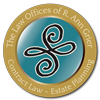

Myth No. 1:
“I’m single and have no children, so I do not need a will.”
Wrong, on many levels.
A: Think about who gets your stuff.
If you have a bank account, own a home, a car, or have any significant assets of any kind, the first reason you want a will is to be sure that whatever assets you own go to the person or persons you want to get them, with the least amount of hassle.
With no will, the State of Georgia decides who gets any property, even if it’s just a small amount of savings or a car that’s paid for.
If you are single with no children at your death, under Georgia law (O.C.G.A. § 53-2-1) the following people will be your legal heirs and thus entitled to your entire probate estate if you die without a valid will ("intestate"):
- Your living parents, equally; if both your parents are deceased then
- Your siblings, equally, and a deceased sibling’s child(ren) will take the deceased sibling’s share; if no living siblings and no nieces or nephews, then
- Your living grandparents, equally; if all your grandparents are deceased then
- Your aunts and uncles, equally, if living, and if a deceased aunt or uncle left children, those children take the share of their deceased parent; if no aunt or uncle is living, then
- Your first cousins, equally, and the Court will determine which cousins are closest in line to you in order to determine their status as a legal heir.
And if you are in a committed relationship (but not married) and you die with no will, your significant other has no legal claim to any assets you alone own that will pass through your estate.
Please Note: If you are married with no kids and no will, your spouse is your sole legal heir – until you have children. Once you have kids, each child becomes another legal heir on the same footing as your spouse – but the spouse’s share never goes below 1/3 of the estate.
Please Note: If you are contemplating or in the process of obtaining a divorce, until the divorce decree is entered, your spouse remains your legal heir. Prior to the divorce, however, you can write a valid will that contemplates divorce and effectively excludes your spouse from your probate estate. Jointly held assets, however, will pass to the survivor until they are sold or retitled in the name of one of the joint owners.
B: Think about who has to sort it all out – with no instructions from you.
If you have no spouse and no children, but you do own some assets like a simple checking account, your untimely death will result in a real headache for next-of-kin, who won’t be able to access any information about your money without first preparing and filing a Petition for Letters of Administration in the Probate Court of your county of residence. Many people find the forms and process confusing and complicated. The probate court will likely require the person who goes to this trouble to post bond and file an inventory of your assets and annual reports. The process may be tedious and expensive.
Having a will – if only to give your loved ones the opportunity to simplify the estate administration process – is a relatively inexpensive way to save those you care about most a whole lot of time and trouble and make sure the people you really do care about get whatever you have after you’re gone, not who the State of Georgia says. And if you don’t have a will, any money you do have may sit frozen in the bank until someone decides it’s worth the trouble.
Myth No. 2:
“I do not need a will because I’m married and everything I own is jointly owned with my spouse or is payable to my spouse as my sole beneficiary should I die.”
A: I have no kids, so everything will be easy.
This myth ignores the possibility that you and your spouse die together while traveling or otherwise by accident. All the problems listed above under Myth No. 1 will spring up - but doubled - if neither you nor your spouse has a valid will. The two families are left with the marital property, and no direction as to who you want to take the lead in the administration, or who you would name as your contingent beneficiaries.
B: My kids are minors, so my spouse will get everything.
Georgia law does not give everything to your spouse if you have kids – either from a prior marriage or with the spouse; your spouse and your kids take equally, no matter the age of your kids. What’s worse, this myth again ignores the possibility that you and your spouse die together, in which case your minor children will be without you and without the benefit of knowing you had arranged for your pick to be guardians. Meaning you have no say-so in who becomes the legal guardian(s). One of the most important things you do in a will is name guardians of your kids should you die before they reach age 18. Plus, as explained in No. 1 above, your children are equal heirs with your spouse.
Myth No. 3:
“I don’t need a will because I have no kids and I wrote a will before I got married.”
Marriage, divorce, and having a child all can operate to invalidate a will executed prior to the event in question, except in rare circumstances. If you are divorced and have a child, and you then write a will to leave your child everything, you might be able to make it so that a subsequent marriage will not invalidate the will, but your estate might also face a big legal fight. Best to consult a lawyer about preparing the pre-nup or waivers necessary for a spouse to relinquish a legal claim to the deceased spouse’s estate – including IRAs. This is a myth that has too many “what if’s” to address here. Suffice it to say, you need to consult a good estate planning attorney.

Myth No.4:
“My family can avoid probate if I name Pay On Death (“POD”) beneficiaries to all my assets, so no will needed.”
This solution may work in limited circumstances, depending on whom you’ve named as your POD beneficiary, and how your assets are titled. If you own any real estate (including your home) with no co-owner or have a checking account that is not jointly owned, it is likely that your next of kin will need to get title to those items transferred to the legal heir(s) (see Myth 1 for who that will be if you’re not married). Many banks do not allow you to name a POD beneficiary to your individually-owned deposit accounts, although you might ask your bank just in case.
Myth No. 5:
“Any debt I owe at my death will have to be paid by my spouse or kids.”
False, unless you and your spouse (or child) are both listed as borrowers. As a rule, debt of a decedent is payable only by the decedent’s probate estate, i.e., assets that do not pass automatically by virtue of a POD form or by survivorship rights. Note, however, that any debt you have at your death that is secured by real or personal property is subject to foreclosure or repossession to satisfy the remaining debt. Any unsecured debt is payable by your estate, and your probate assets are subject to such claims. Your administrator may be able to negotiate amounts with the creditors.
If your only debt is your home, and the home is jointly owned with your spouse (with right of survivorship), but the spouse is not listed on the note, the mortgage company may foreclose on the house if the surviving spouse is unable to assume the mortgage note or obtain separate financing.
These are general observations and considerations, not legal advice, and no attorney-client relationship is created by this article. Every case is unique and requires specific analysis by a reputable, experienced estate planning attorney licensed to practice in your state of residence.
Please contact Ann Grier (404) 692-8555 to discuss your specific Georgia matter.
